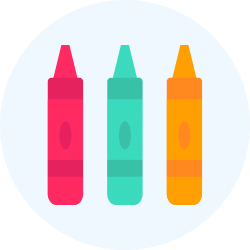UKG Exam > UKG Notes > EVS for UKG > Quiz PPT: Our Body
Quiz PPT: Our Body | EVS for UKG PDF Download
| Download, print and study this document offline |
Please wait while the PDF view is loading
Page 1 B o d y P a r t s Human Body Quiz Page 2 B o d y P a r t s Human Body Quiz Let's check how much you have learnt about body parts! Page 3 B o d y P a r t s Human Body Quiz Let's check how much you have learnt about body parts! Part 1 Write “true” or “false” Page 4 B o d y P a r t s Human Body Quiz Let's check how much you have learnt about body parts! Part 1 Write “true” or “false” Question 1 This body part is called a hand? True or false? Page 5 B o d y P a r t s Human Body Quiz Let's check how much you have learnt about body parts! Part 1 Write “true” or “false” Question 1 This body part is called a hand? True or false? Q ue stion 2 The body part that is connected to the neck is called the feet? True or false?Read More
|
24 videos|122 docs|4 tests
|
FAQs on Quiz PPT: Our Body - EVS for UKG
| 1. What are the main systems of the human body? |  |
Ans. The human body comprises several main systems, including the circulatory system, respiratory system, digestive system, nervous system, musculoskeletal system, endocrine system, and immune system. Each system has specific functions that contribute to overall health and well-being.
| 2. How does the circulatory system function? |  |
Ans. The circulatory system, also known as the cardiovascular system, is responsible for transporting blood, nutrients, oxygen, carbon dioxide, and hormones throughout the body. It consists of the heart, blood vessels, and blood. The heart pumps blood through arteries to the tissues and returns it via veins, ensuring that all body cells receive the necessary substances to function properly.
| 3. What role does the respiratory system play in the body? |  |
Ans. The respiratory system is responsible for the exchange of gases between the body and the environment. It allows oxygen to enter the body while expelling carbon dioxide. Key components include the lungs, trachea, and diaphragm. During inhalation, air fills the lungs, and oxygen diffuses into the bloodstream, while carbon dioxide is expelled when exhaling.
| 4. What is the function of the digestive system? |  |
Ans. The digestive system processes food to extract nutrients and eliminate waste. It includes organs such as the mouth, stomach, intestines, liver, and pancreas. The system breaks down food into smaller molecules, allowing the body to absorb essential nutrients for energy, growth, and repair, while also managing waste removal.
| 5. How does the nervous system coordinate body functions? |  |
Ans. The nervous system coordinates body functions by transmitting signals between different body parts. It consists of the brain, spinal cord, and peripheral nerves. This system processes sensory information, controls movement, and regulates bodily functions through a network of neurons, ensuring rapid communication and response to internal and external stimuli.
Related Searches















